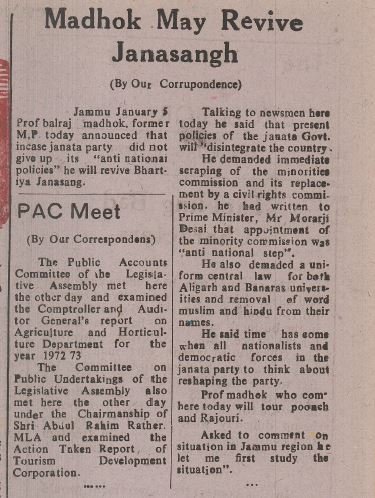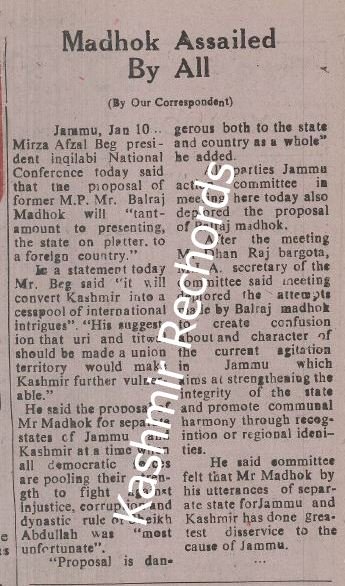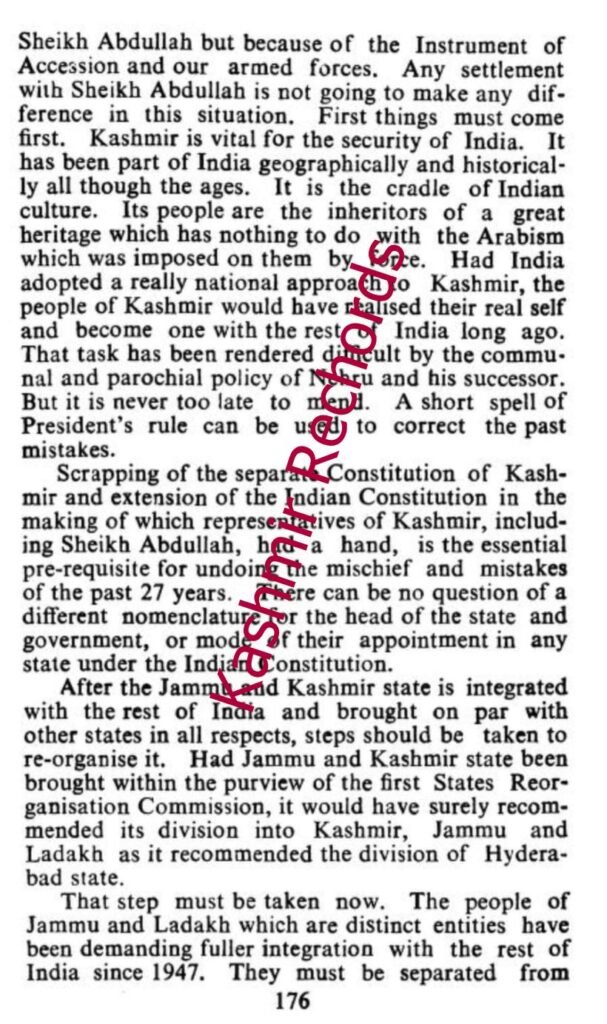Kashmir Rechords Desk

January 1979 – The political landscape of Jammu and Kashmir was rocked by the explosive and visionary proposals of Balraj Madhok, a veteran leader of the Jana Sangh and a former Member of Parliament. Known as a “son of the soil,” Madhok’s controversial views on the reorganization of the State drew widespread attention and criticism at that time. Yet, forty years later, the echoes of his bold statements seem eerily prescient.
In a series of press conferences and public meetings in the Jammu region in 1979, Madhok advocated for a dramatic restructuring of Jammu and Kashmir. Kashmir Rechords is in possession of some newspaper cuttings of that period that make a mention of these proposals and the collective condemnation he had received at that time.
Even though at the heart of Madhok’s vision which he had shared in so many books also, he envisioned that Jammu and Kashmir State warranted a tailored administrative structure. In his scheme of things, Jammu and Kashmir regions had to function as separate States distinct from each other.
Madhok’s Blueprint for Reorganization
While Madhok had proposed separate statehoods for Jammu and Kashmir, his advocacies had included Teetwal, Karan, and Uri areas to be crafted as Union Territory besides Ladaakh as according to him, these regions had their own distinct identity which did not align with the broader Kashmiri representation.

Madhok’s proposal of 1979…
Madhok’s proposals were naturally met with a storm of criticism from various quarters. Political leaders across Jammu and Kashmir, as well as members of the then Janata party had ridiculed and dismissed his suggestions. The idea of reorganizing the State was seen as radical and unpalatable, even within its ranks. Critics had lambasted him for sowing division and for his perceived alignment with Indira Gandhi and Sheikh Mohammad Abdullah, despite his otherwise staunch opposition to their policies.
Fast forward to August 5, 2019, and the Government of India implemented a sweeping reorganization of Jammu and Kashmir. Article 370 was abrogated, and the State was bifurcated into two Union Territories: Jammu & Kashmir and Ladakh. This historic move bore striking resemblances to Madhok’s proposals from 1979, albeit with some modifications.

Echoes of the Past: The 2019 Reorganization
Ladakh was finally recognized as a Union Territory, as Madhok had long championed.The region of Jammu and Kashmir was restructured into a Union Territory, aligning partially with Madhok’s vision, though his call for separate statehood for Jammu was not realized.
The Legacy of a Visionary
While Balraj Madhok’s ideas were deemed too radical for their time, the eventual reorganization of Jammu and Kashmir in 2019 underscores a significant, albeit delayed, validation of his foresight. Even though these proposals seemed outrageous at that time, the subsequent events and the historic move to scrap Article 370 appear to bear striking resemblance to many features of the 1979 Madhok proposals albeit with certain modifications after having taken into account the contemporary realities of our times.
Today, as we witness the evolving dynamics of Jammu and Kashmir, Balraj Madhok’s contributions offer a compelling narrative of how bold ideas can eventually reshape the course of history, even if their merit is recognized only in hindsight.
Madhok’s political philosophy reflects radical ideas should not be subservient to political correctness of the times.
